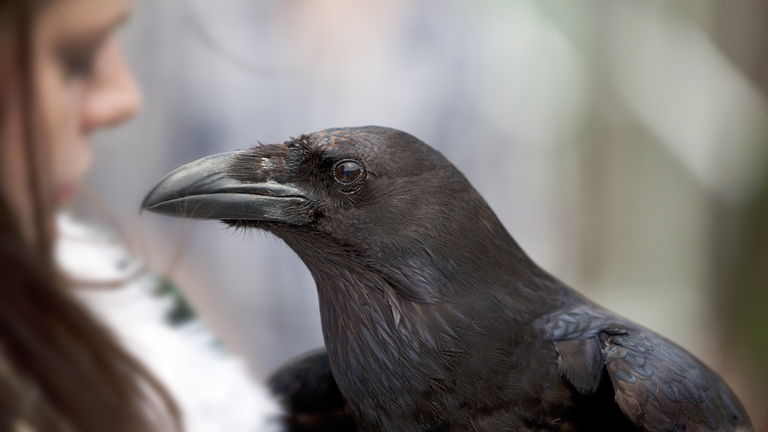
Intelligence Research: As Clever as a Monkey
What Does the Neuron Number Tell Us About Cognitive Abilities?
Are animals with a high neuron number more intelligent than others? Professor Onur Güntürkün from the Ruhr University Bochum conducted a trial of cognitive strength between three species with quite different neuron numbers in their brains – apes, corvids and pigeons.
“Feathered Apes”
On the scale of intelligence great apes have been usually
regarded as the unchallenged number one of all animals. It was assumed
that the reason for this is the size of their brain which is – in
absolute numbers as well as in proportion to their body weight – quite
big. Birds, on the other hand, have rather small brains which might
suggest that they are less intelligent. New research methods, however,
allow us to compare not just brain sizes but also neuron numbers. These
comparisons reveal that the neuronal density in brains of parrots and
songbirds is often higher than in brains of some primates. Furthermore,
recent research has shown that, when it comes to cognitive processing,
they do as well as our closest relatives, thus earning the nickname
“feathered apes”.
Biopsychologist Onur Güntürkün and his research team are now asking
whether the neuron number in the brain might be able to serve as an
indicator to determine an animal’s cognitive performance. In order to
answer this question, they compared a number of cognitive tests which
had been conducted with corvids as well as apes. They also included test
results of pigeons in their review, because pigeons possess a
comparatively low neuron number and can therefore be expected to do
worse in the tests than the other species. The results of this
comparison have been published in the journal “Current Opinion on
Behavioral Sciences”.
Surprising Outcome
In their survey the research team incorporated studies on five different areas of cognition: Short-term memory, object permanence, abstract numerical competence, orthographic processing and self-recognition. Apes and corvids performed equally, even though corvids possess far less neurons than apes. Particularly astonishing, however, was the performance of pigeons. In three out of five tests, they were able to match the other two species. Only the skills self-recognition in the mirror and object permanence – the ability to realize that an object does not cease to exist, just because it is hidden – could not be demonstrated to the same degree as in apes and corvids. The impressive performance of the pigeons is all the more interesting, when we consider that the neuron number in their brains is by far the lowest. It demonstrates that neuron numbers are not the only criterion accounting for cognitive performance. “Our research has shown that the way in which we compare cognitive abilities is often ill-suited.”, explains Professor Güntürkün. “It should not just depend on whether or not an animal is able to master a task but also on how much time it requires”. Again, pigeons differ from corvids: While pigeons were able to solve the same intelligence tests as corvids, they needed much more time to learn it. Furthermore, they were less flexible than the “feathered apes”, when it came to applying the acquired knowledge to new situations. The neuron number in the brain does therefore not permit direct conclusions as to the intelligence of an animal. However, according to the research team, it is a factor which influences the learning aptitude and the cognitive flexibility of an animal.
